|
|
|
Sort Order |
|
|
|
Items / Page
|
|
|
|
|
|
|
| Srl | Item |
| 1 |
ID:
114820
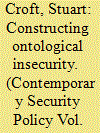

|
|
|
|
|
| Publication |
2012.
|
| Summary/Abstract |
The development of ontological security studies, for example by Mitzen, Steele, and Berenskoetter and Giegerich, has been an important innovation in the field. However, by focusing on the level of the state rather than that of the individual, this new tradition is somewhat different from the intellectual origins of ontological security in sociology and psychology. Drawing on those disciplines, I argue that the key focus should be on the understandings of individuals about their own security, intersubjectively constructed. Ontological security can be understood in terms of the need to construct biographical continuity, to construct a web of trust relations, to act in accordance with self-integrity, and to struggle against ontological insecurity, or dread, in Kierkegaard's sense. I then take and apply this framework to understand the process by which British Muslims have become insecuritized (understood as a term through which dominant power can decide who should be protected and who should be designated as those to be controlled, objectified, and feared) in the period since 9/11.
|
|
|
|
|
|
|
|
|
|
|
|
|
|
|
|
| 2 |
ID:
189991
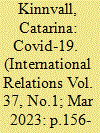

|
|
|
|
|
| Summary/Abstract |
This short article discusses how different fantasy narratives have come together during the Covid-19 crisis in various far-right movements, parties and audiences across the world and how much of these fantasies rely on racialised and gendered notions of a fantastical world-order in which particular forms of emotional governance provide a relief and sense of security to certain societal groups. This involves a close engagement with crisis and crisis narratives in relation to ontological insecurity and anxiety; how such crisis narratives have materialised in fantasies related to borders and corona nationalism, and the emotional governance of these particular fantasies in the hands of populist leaders and their increasingly receptive audiences.
|
|
|
|
|
|
|
|
|
|
|
|
|
|
|
|
| 3 |
ID:
167599
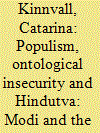

|
|
|
|
|
| Summary/Abstract |
In an era increasingly defined by insecurity and populist politics, India has emerged as a forceful ontological security provider under the leadership of Marendra Modi. If ontological security is about finding a safe (imagined) haven, then ontological insecurity is about the lack of such a space in narrative terms. Drawing on Lacanian understandings of ‘the imaginary’ as something that can fill and naturalize this lack of space, the article is concerned with how memories, places and symbols of narrative identity constructions are used in populist discourse. More specifically, it attempts to understand the relationship between ontological insecurity and the imaginaries of populist politics in India. In so doing, it argues that the re-invention of ‘nationhood’, ‘religion’ and ‘Hindu masculinity’ along gendered lines has created a foundation for governing practices aimed at ‘healing’ a number of ontological insecurities manifest in Indian society. It specifically looks at how the Modi doctrine has formulated and expanded its foreign policy discourse into one that privileges populist narratives of nativism, nationalism and religion as forms of ontological security provision at home and abroad, but also how everyday practices can challenge such narratives, thus allowing different imaginaries of the Indian state.
|
|
|
|
|
|
|
|
|
|
|
|
|
|
|
|
| 4 |
ID:
167598
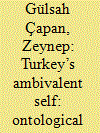

|
|
|
|
|
| Summary/Abstract |
This article aims to understand the ‘non-Western self’ and the different ways its ontological insecurity can manifest, through the example of Turkey, by contrasting Kemalism’s modernizing vision with Erdoğan’s current populism. We argue that the constructions of political narratives in Turkey (and by implication in other similar settings) derive from two interrelated aspects of the spatio-temporal hierarchies of (colonial) modernity: structural insecurity and temporal insecurity. Modern Turkey’s ontological insecurity was constructed spatially, on the one hand, as liminality and structural in-betweenness, and temporally, on the other, as lagging behind the modernization of the West. After discussing how Kemalism offered to deal with such insecurities in the twentieth century, we analyse the Justice and Development Party (AKP) period of the twenty-first century as an alternative attempted answer to these problems and explain why efforts to dismantle the Kemalist framework collapsed into its populist mirror image. The example of the Turkish case underlines the importance of focusing on the different ways in which the structural and temporal insecurities of ‘the non-Western self’ take shape at a given point and manner of entry into the modern international order.
|
|
|
|
|
|
|
|
|
|
|
|
|
|
|
|
| 5 |
ID:
167601
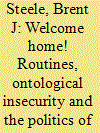

|
|
|
|
|
| Summary/Abstract |
This article investigates the military ‘reunion’ videos that proliferated in the United States throughout the late 2000s and early 2010s. The typical video entails a returning soldier who surprises a family member, usually a child or female spouse, at a public event. I articulate the reunion video as a key feature of populism in contemporary US society. The videos can be considered examples of the ‘encounters’ theorized by both Anthony Giddens and Erving Goffman. Both private and public ‘social occasions’ with performative qualities of ‘day-to-day life’, the videos disclose the institutional and societal routines of not only a family but broader layers and circles of the US political community. They relate not only to loss but also to redemption. The article therefore investigates when and how, and provides a provisional argument for why, these videos have proliferated by consulting the everyday features of ontological security. It focuses on both the local and the international contexts within which they attend to, but also generate, US ontological insecurity.
|
|
|
|
|
|
|
|
|
|
|
|
|
|
|
|
|
|
|
|
|